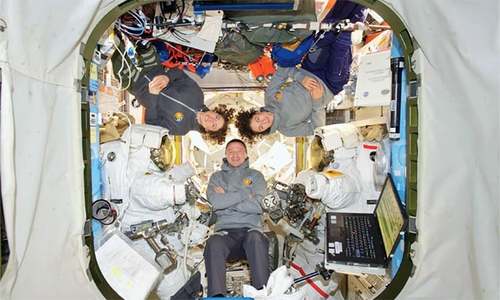WASHINGTON: Boeing’s Starliner crew capsule successfully performed an emergency abort test on Monday, meeting a key requirement before it can take US astronauts to the International Space Station as early as next year.
The test took place in the New Mexico desert at the White Sands Missile Range and lasted around 95 seconds.
The Starliner was set on a small launch pad with four engines to simulate an emergency in which the capsule — attached to the top of a rocket — would need to quickly separate to bring the astronauts safely back to Earth.
Its four engines ignited and blasted the Starliner at full speed to the sky. After 20 seconds its parachutes deployed and the spacecraft gently drifted to the ground, landing on the desert floor cushioned by large air bags.
“The test team and spacecraft performed flawlessly,” said Starliner programme manager John Mulholland.
“Emergency scenario testing is very complex, and today our team validated that the spacecraft will keep our crew safe in the unlikely event of an abort.” Boeing is one of the companies, along with SpaceX, that Nasa has chosen to build spacecraft to shuttle astronauts to the ISS.
Since the end of the US Space Shuttle programme in 2011 only the Russians with their Soyuz system have had the capacity to travel from the Earth to the ISS.
Boeing is planning to launch an unmanned Starliner capsule on Dec 17 to the ISS, as SpaceX did with its Crew Dragon capsule in March.
The first missions carrying humans should take place in 2020, according to Nasa, but this schedule depends on the success of several upcoming tests. SpaceX, for example, has yet to finalise parachute tests of its capsule.
“We hope we never need to use this system, but in case we ever have any trouble aboard the beautiful Atlas V on the launch pad, we know, after today’s test, that we’ll be able to get off safely and then come back and try again a different day,” said former Nasa astronaut and Boeing test astronaut Mike Fincke.
“It’s been a long time since we’ve launched out of the United States,” added Fincke, speaking after the White Sands test.
“We really appreciate our friends in Russia for having the launch vehicle and the Soyuz. I flew on it twice. It’s a great launch vehicle, great spacecraft but it’s time to have more options,” he said.
Published in Dawn, November 5th, 2019














































